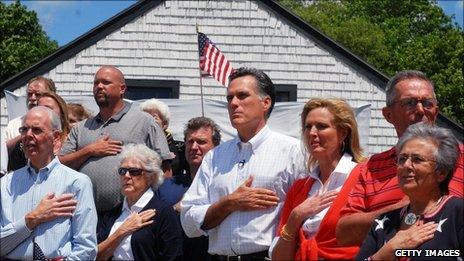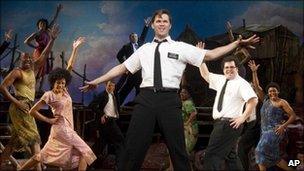Is the US ready for a Mormon president?
- Published

Romney (centre) has made the economy, not social issues, his central theme
Mormon Mitt Romney is an early frontrunner among the Republicans vying to run for president - and one new opinion poll shows him in a surprise dead heat with Barack Obama. Another Mormon, Jon Huntsman, is expected to enter the race. Will their religion be an issue?
It's a nation that prides itself on having few barriers to the highest office.
Yet the prominence of two Mormons in the Republican race for the White House has raised questions about US attitudes towards the religion.
The Church of Jesus Christ of Latter-day Saints, to give its proper name, was founded in 1830 in New York State by Joseph Smith, and today has about 5.7 million members in the US.
But whether it is fully accepted is another matter, and new findings published by the Pew Research Center suggest there is still a long way to go.
Although 68% of Americans polled said their support for a candidate would be unaffected if they were Mormon, a quarter said they would be less likely to vote for them.
This rose to 34% among white evangelicals, who make up a large part of the Republican base. "It's more prevalent among the [voters] who are going to play a role in this Republican primary process," says Carroll Doherty, of the Pew Research Center.
When Pew polled in 2007, the figures were similar and there was also a comparison with other faiths. Attitudes towards Mormons were much less favourable than other Christian faiths, but better than those for Muslims or atheists.

Jon Huntsman, also a Mormon, is said to be eyeing the White House
Those polled mainly associated the faith with polygamy, practised by some fundamentalists despite it being banned among Mormons since 1890.
But Mr Doherty believes Mr Romney's faith is not going to be his biggest problem - his policies are a "bigger factor than his religion".
Most Republicans loathe President Obama's plan for healthcare reform, <link> <caption>says the BBC's Mark Mardell, </caption> <altText>Mark Mardell on Mitt Romney</altText> <url href="http://www.bbc.co.uk/news/world-us-canada-13384144" platform="highweb"/> </link> which makes nearly all Americans take out health insurance. When Mr Romney was governor of Massachusetts, he introduced a similar scheme for the state.
In the 1960s, there was a similar debate about whether the US was ready for a Catholic president - and having elected John F Kennedy, it clearly was, says Steve Mitchell, of political polling company Mitchell Research.
If the presidential race comes down to a Mormon Republican v a non-Mormon Democrat, evangelical Christians would still back the Republican, he says.
"Romney has never appealed to evangelical Christians because they have some concern about his position on abortion and also because of his religion.
"But he does attract the fiscal conservatives, and this election will be fought on fiscal matters and the economy. The stronger opposition to Mormons is among liberals and they just don't want Romney as a candidate."
Evangelical Christians reject the Book of Mormon, the sacred text of the Latter Day Saint faith, and do not consider Mormons to be true Christians. On occasions, these tensions are laid bare.
Southern Baptist and fellow Republican Mike Huckabee apologised to Mr Romney in 2007 after publicly asking whether Mormons believed Jesus Christ and Satan were brothers.
Mark DeMoss, a Southern Baptist who runs a PR company that works with evangelical communities, says some Christians cannot accept Mormons.
It requires a change in mindset, says Mr DeMoss, who is also an unpaid adviser to the Romney campaign.
"When a pastor says to me 'Help me get past this Mormon thing', I say to him: 'Would you let a Mormon money manager manage your assets?' They say 'Yes'. Then I say: 'Would you let a Mormon architect design a new building for your school?' They say 'Yes'. Then I say: 'Would you let a Mormon surgeon operate on you?' And they say 'Yes'. And I say: 'Then why won't you support a Mormon president?' And they say 'Oh, yes'."

A musical satire about Mormon missionaries has won awards on Broadway
Mormons themselves believe any reservations lessen when people get to know them.
Michael Purdy, a spokesman for the church, says: "For the most part, misconceptions stem from a simple lack of information. When people are better informed - when they have learned who we are and what we believe from credible sources - it removes that sense of other that seems to come with being a part of any lesser-known group."
It would be wrong to think of Mormons as socially conservative, he says.
"There are examples of Mormons in both major parties and across the political spectrum including Democratic Senate Majority Leader Harry Reid and Republican Senator Orrin Hatch.
"We encourage all citizens to participate in the political process - to learn about and support the candidates that most closely match their idea of good government."
What does Mr Romney himself say about his faith?
This week, when <link> <caption>asked by CNN's Piers Morgan</caption> <altText>CNN website</altText> <url href="http://piersmorgan.blogs.cnn.com/2011/06/07/mitt-romney-on-gay-marriage-mormonism-and-whether-they-intersect-to-form-his-personal-views/" platform="highweb"/> </link> , Mr Romney said his religious beliefs did not inform his policies, and he thought most voters did not consider it relevant.
Perhaps he should stop considering his faith as a disadvantage and exploit it as a plus, says Timothy Stanley, a research fellow in American history at Royal Holloway College in London.
"His precise theology won't lose him votes, but the fact that his religion has suffered persecution will win him votes. The biggest theme at the moment in evangelical orthodox fundamentalist culture is that of persecution at the hands of a liberal secular state."
If Mr Romney is looking to define himself in the early stages of the contest, says Mr Stanley, this could be a positive way of doing it.
Opinion polls can't really be trusted to give an accurate picture, he says, and what could happen is the reverse of the Bradley effect - when voters in 1982 appeared to tell pollsters they would vote for African-American Tom Bradley as governor of California, but didn't.
Some evangelicals might say they would reject a Mormon. But at the ballot box it would have little impact, he says, as President Obama's handling of the economy is unpopular in Middle America.
These voters will mainly care about whether he can create jobs.
"Every four years, everyone says evangelicals will vote on a particular reading of the Bible, but they don't. They are motivated by the same things as everyone else - jobs and interest rates."
- Published18 May 2011